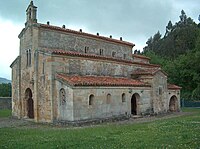Villaviciosa, Asturias
Villaviciosa | |
|---|---|
 Villaviciosa city hall | |
 Location of Villaviciosa | |
| Coordinates: 43°29′N 5°26′W / 43.483°N 5.433°W | |
| Country | Spain |
| Autonomous community | Asturias |
| Province | Asturias |
| Comarca | Gijón |
| Founded | 17 October 1270 |
| Capital | Villaviciosa |
| Government | |
| • Alcalde | Manuel Busto Alonso (Unión Asturianista) |
| Area | |
• Total | 276.23 km2 (106.65 sq mi) |
| Elevation | 662 m (2,172 ft) |
| Population (2018)[1] | |
• Total | 14,430 |
| • Density | 52/km2 (140/sq mi) |
| Demonym | maliayo/a |
| Time zone | UTC+1 (CET) |
| • Summer (DST) | UTC+2 (CEST) |
| Postal code | 33300 and 33310 al 33318 |
| Official language(s) | Spanish |
| Website | Official website |
Villaviciosa (Asturian pronunciation: [biʎaβiˈθjosa], Spanish pronunciation: [biʝaβiˈθjosa]) is a town and municipality in the autonomous community of Asturias, Spain.[2]
Geography



Villaviciosa is situated on the central eastern coastline, and borders the Asturian municipalities of Gijón and Siero to the west, Sariego, Nava, Cabranes and Piloña to the south and Colunga to the east. The total area is 276.23 square kilometres (106.65 sq mi)
Demographics
It had a population of 14,962 in 2011.[citation needed]
Parroquias
The capital is the town of the same name. It is 2 km2 (0.77 sq mi) in size.
Villaviciosa includes 41 parroquias (parishes):
Notable people
- José Ángel Hevia Velasco, musician, was born in the town.[3]
Notable buildings

pre-romanesque style
- Church of San Salvador de Valdediós
- Church of Santa Eulalia de la Lloraza
- Iglesia de Santo Tomás
- Monasterio de San Martín
References
- ^ Municipal Register of Spain 2018. National Statistics Institute.
- ^ "Portada - Ayuntamiento de Villaviciosa". www.villaviciosa.es. Retrieved 16 January 2019.
- ^ "Hevia - MusicBrainz". musicbrainz.org. Retrieved 16 January 2019.




